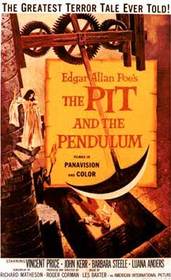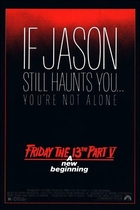Our editor-in-chief Nate Yapp is proud to have contributed to the new book Hidden Horror: A Celebration of 101 Underrated and Overlooked Fright Flicks, edited by Aaron Christensen. Another contributors include Anthony Timpone, B.J. Colangelo, Dave Alexander, Classic-Horror.com's own Robert C. Ring and John W. Bowen. Pick up a copy today from Amazon.com!
Pit and the Pendulum (1961)
There are occasions when separating oneself from a film review is nigh-on impossible. This is one of those times. After The Wolf Man, Roger Corman's Pit and the Pendulum was the second horror film I ever saw in its entirety - an experience that solidified not only my adoration for the genre, but also my lifelong love for all things Vincent Price. Watching it again caused a wave of nostalgia that overcame the movie's occasionally creaky dialogue and dusty first half. There are simply films that are so much better than their flaws -- indeed, better because of their flaws. This is one of them.
A generation after the Spanish Inquisition has come to an end, Nicholas Medina (Vincent Price) is still tormented by the acts of his sadistic father, who tortured and killed his adulterous mother before his very eyes. If that wasn't bad enough, Nicholas also has to contend with the shocking death of his own wife, Elizabeth (Barbara Steele). But if Elizabeth is really dead, who has been whispering to Nicholas and playing the harpsichord late at night? The answer may be too much for the poor man's fragile mind...
After the opening titles, which play over flowing fluorescent liquids to Les Baxter's eerie reverberating score, we find ourselves in familiar territory (at least if you've seen Corman's previous Poe film, Fall of the House of Usher). A young man (John Kerr, South Pacific) approaches an old dilapidated homestead to demand answers regarding a woman close to his heart. From there, screenwriter Richard Matheson (The Incredible Shrinking Man, "The Twilight Zone") uses Usher's basic framework to stretch out Poe's short, claustrophobic story. He tosses in elements from the author's other works and gives them all a Freudian edge (something that Corman illuminates with some striking and subtle visuals).
The result, alas, can be a bit plodding. Although the story is paced well enough, and an air of the macabre is maintained throughout, there are moments where one can plainly see that the plot is nothing more than an excuse to get to the titular apparatus. These moments are not frequent, but they exist, and serve to take the viewer out of the experience.
Notably, all of these unfortunate pauses in momentum take place when Price is absent from the screen. As with so much of his work, he owns every frame that he is in. His character here is more tortured than perhaps any other he's played - a man haunted by his past and tormented by his present. Every gesture, every facial expression, the way his bottom lip quivers at the slight disturbance - everything is sloshing with pathos. It's histrionics as only Price can do: technically overacting, but who gives a damn? The man makes us believe that a person can be that overwrought, able to scream the word "True" as if it were eternal damnation.
Of course, with an actor like Price, all the others seem to fade into the background. Kerr, something of a minor success in the late 1950s studio scene, attaches a certain "vital import" to every syllable. His every sentence is an ultimatum, and it becomes very difficult to feel any sympathy for him. Alternately, Luana Anders (as Price's sister) is soft, yielding, and terribly easy to ignore in the presence of more boisterous actors. As family friend Dr. Leon, Antony Carbone adds a weirdly contemporary vibe to the piece, affably tossing off the faux 16th Century dialogue as if it were lunchtime conversation at the local Denny's. Only Steele is able to hold her own ground. She is haunting, cruel, and beautiful, and often all at once.
Adding dazzle to Pit and the Pendulum is Daniel Haller's amazing production design. Although many of the flats were recycled from the New England-set Usher, the look here is very Old Europe. Haller's skill was in choosing just the right furnishings and props to make a set look much more lavish than the budget would indicate. Combined with some clever editing, you could never tell he was working with a handful of sets -- it feels like an entire castle.
Corman himself has grown substantially as a director from Usher (which wasn't such a shabby production itself). The camera is more fluid here, and he makes much better use of the 2.35:1 Panavision aspect ratio. Corman's progress over the course of the Poe cycle is impressive, as one watches him start to shake off certain aspects of his schlock background and become a more assured helmer, although he never loses some of his grandstanding (the multi-colored "stretched" look for harrowing sequences is pure 60s kitsch).
Part of MGM's excellent budget-minded Midnite Movies series, the Pit and the Pendulum DVD features a pretty clean widescreen transfer (although non-anamorphic) and the original mono soundtrack. Corman himself provides a commentary track that focuses mainly on the technical details (although his memory isn't always perfect). For five minutes of total confusion, watch the rarely seen prologue filmed to pad television showings. It has almost nothing to do with the film itself and mainly serves to confuse matters.
Pit and the Pendulum, while perhaps not the best of the Poe cycle, is the most striking to the sense of nostalgia. Wholly a product of its times and brimming with Vincent Price goodness, it's a time capsule from a bygone era, and one that is a delight to discover and rediscover.
Trivia:
For certain shots of the swinging pendulum, Corman removed every other frame to make the blade appear to be moving faster.









Very nice review. I am
Very nice review. I am waiting to see this film but I am currently at the mercy of Netflix which has the film's status at "Very Long Wait". Who knows how long that could take?
This was the first horror
This was the first horror movie I ever saw. I saw it in a theater in Savannah, Georgia with its co-feature, "Fall of the House of Usher." I know what you mean about the feeling of nostalgia, Kevin. Hystrionic or not, I thought Price was so great in that film, and it remains a favorite of mine some 50 years later. What did you think of "Masque of the Red Death"?
Pit and the Pendulum was also
Pit and the Pendulum was also one of my first horror films, Auggie, although I saw it on home video. As for Masque of the Red Death, it's one of my all-time favorites. Just a great, great flick.
"He went for a little walk! You should have seen his face!"